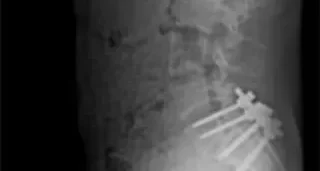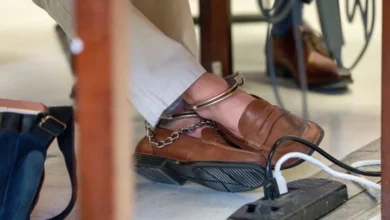The “Radicalized by Pain” Theory Has Many Holes
Luigi Mangione’s back injury has been a key element in the narrative surrounding his case, with the media suggesting that his struggles with chronic pain contributed to his mental health decline and ultimately played a role in his alleged actions. However, the facts paint a different picture—one where his surgery was successful, his pain was alleviated, and his focus shifted to advocating for others facing similar struggles.
The Official Story
According to the publicly available information, Luigi Mangione’s back injury:
-
Nature of the Injury: Mangione suffered from spondylolisthesis, a spinal condition in which a fracture causes a vertebra to slip out of alignment, potentially resulting in severe pain if it puts pressure on spinal nerves.
-
Date of Injury: The condition, which can originate in childhood or from an injury, began negatively impacting his life in his college years, according to his social media posts.
-
Surgical Intervention: After a worsening of his condition during a six-month stay at Surfbreak, a “co-living” space in Honolulu in early 2022, Mangione decided in July 2023 to undergo spinal surgery.
-
Source of Information: Mangione himself was vocal about his journey on Reddit, posting about his recovery and encouraging others with similar conditions to pursue treatment and challenge doctors who dismissed their pain.
-
Post-Surgery Satisfaction: Following his July 2023 surgery, Mangione’s Reddit posts suggest he was overwhelmingly pleased with the outcome, advocating for the surgery and referencing a backpacking trip to Asia earlier this year.
-
Surgical Confirmation: An image posted to an X account linked to Mangione showed what appeared to be an X-ray of a metal rod and multiple screws inserted into his lower spine.
-
Recovery Experience: In an August 2023 Reddit post, Mangione wrote, “Surgery was painful for the first couple days, but I was shocked that by day 7 I was on literally zero pain meds. Obviously will be awhile until I get into rigorous activity, but it was way less of a big deal than I had anticipated.”
A Pain-Free Execution
The success of the surgery and Mangione’s resolution of symptoms seems to be confirmed by the fact that he was physically able to carry out the alleged crime in the manner asserted by the Federal and state criminal complaints, if their version of events is to be believed.
The media narrative (which tends to be fed and controlled by intelligence and law enforcement) has worked to connect Mangione’s chronic pain and subsequent surgery to a supposed mental health decline, yet all available evidence suggests he was not only satisfied with the surgery but actively encouraging others to pursue similar treatment. His movements leading up to his arrest were precise and physically demanding: His movements leading up to his arrest were precise and physically demanding:
-
Physical Activities: Mangione meticulously executed his alleged plan without any signs of physical limitation. His itinerary included extensive bus travel, hostel stays, long walks, and even bike riding—all of which would be incredibly difficult for someone struggling with chronic back pain or recovering from spinal surgery.
-
No Complaints in Custody: Once in custody, Mangione did not disclose any physical or mental health conditions to the court at his arraignment—something that would be expected if his back condition were still a major factor in his daily life. If he had lingering issues, disclosing them would have been crucial to ensure appropriate accommodations.
-
Absence of Medication Disclosures: Chronic back pain typically requires ongoing medication or treatment, yet Mangione has made no mention of this to his legal team or the court.
Legal Considerations: Why This Matters
As an attorney, this omission raises important questions. If Mangione had a significant back injury that required surgical intervention, it would be expected that his legal team would ensure the court had awareness of it. However, the absence of such disclosures suggests that Mangione himself no longer considers it a significant issue. His failure to mention his spinal condition or surgical history in court filings indicates that he either views himself as fully healed or does not see it as relevant to his current situation.
This lack of disclosure is telling—if his back condition had been debilitating or an ongoing concern, one would expect it to be raised in court for potential accommodations such as specialized bedding or medical attention. Instead, his silence implies that the surgery was not only successful but so effective that he no longer considers it a part of his daily challenges. This raises further doubts about the media’s portrayal of his injury as a driving force behind his alleged actions.
-
Medical Documentation: Courts and prisons typically require official documentation to ensure necessary accommodations are provided. If Mangione’s back condition were still a concern, it would be logical for such filings to be presented.
-
Accommodations: If Mangione still experienced any residual issues from his surgery, he could have requested accommodations such as a medical mattress, mobility assistance, or modifications to his daily routine in custody. The absence of such requests suggests he does not see the injury as a hindrance.
-
Strategic Defense Considerations: In cases where an individual has a significant medical history, it is common to incorporate such information into the defense strategy. Mangione’s choice not to do so indicates that his surgery was so successful that he does not consider it relevant to his current circumstances.
The Back Injury Narrative: A Media Creation?
Given the lack of court filings and Mangione’s own contentment with the results of his surgery, it appears the media has emphasized his back injury to create a more compelling story. His last Reddit post on May 17 indicates no complications or renewed pain, and he appeared to be enjoying an active lifestyle.
While Mangione’s back injury was undoubtedly real and required surgical intervention, the idea that it contributed to a mental decline leading to his alleged crimes is not supported by the available facts. If anything, his documented satisfaction with the surgery contradicts this narrative.
Final Thoughts
Luigi Mangione’s back injury and subsequent surgery were significant events in his life, but I suspect that their role in his motive for the alleged crime has been greatly exaggerated, if not entirely fabricated. The absence of medical disclosures, his physical capabilities during the alleged offense, and his lack of complaints in custody strongly suggest that the surgery was successful and no longer an issue. It is worth questioning why this injury has been highlighted so heavily in the media and portrayed as some sort of genesis for a hatred of health care companies.
If he was going to be radicalized by his pain, this would have happened to him in the time period PRIOR to his successful back surgery. It doesn’t add up that he became radicalized AFTER the relief of his pain through an effective procedure that he was by all accounts very happy with.
Reminder: Please subscribe to access all Luigi Mangione content, including live pre-trial hearing and trial coverage. You have until 2/15/2025 to take advantage of the “Luigi Special” below, only $4/month (20% off)!
To subscribe click link below:
An Astonishing Achievement | Lauren Davidson-Ibarra | Substack






Hi, this is a comment.
To get started with moderating, editing, and deleting comments, please visit the Comments screen in the dashboard.